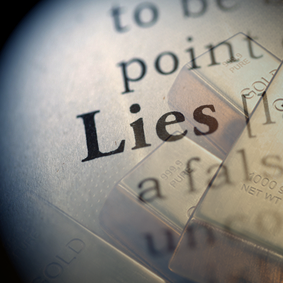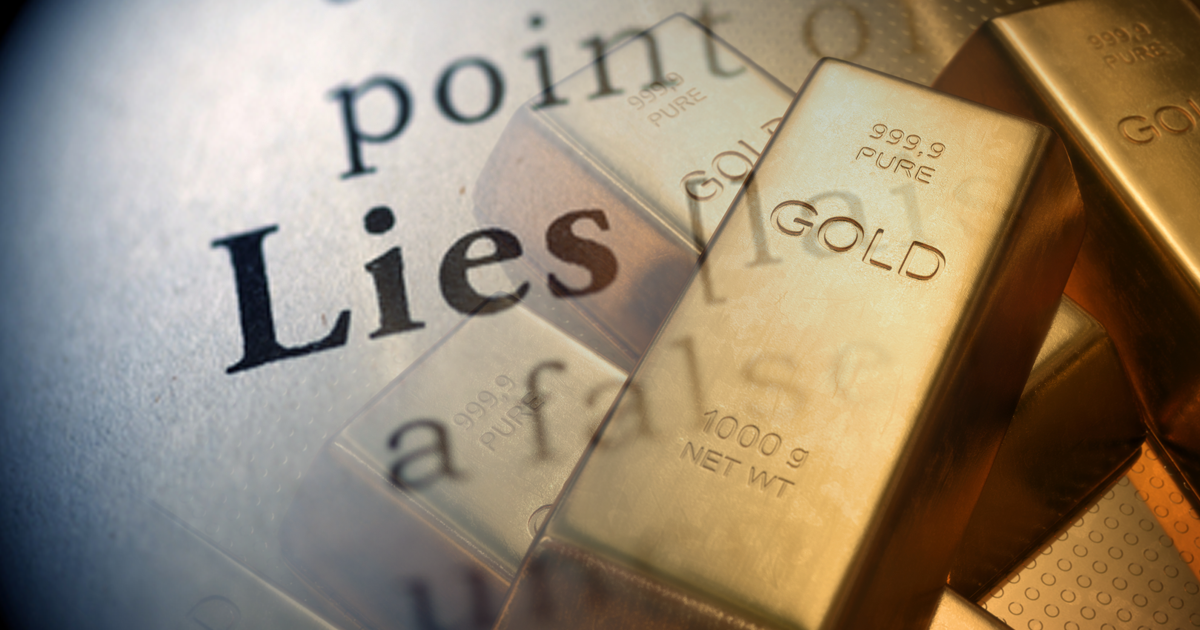It’s hard to say which lie about gold is the biggest whopper.
Many widely held beliefs about gold are lies – propaganda hammered home to have us believe the only true measure of wealth is government-issued debt.
Big Lie #1: Gold is a barbarous relic.
Repeated for decades, this misquote of 20th Century socialist economist John Maynard Keynes perpetuates a lie exploited as an almost biblical prophecy of gold’s demise.

What Keynes wrote in 1923 was “the gold standard is already a barbarous relic.” Big spender Keynes was advocating legislation to demolish gold’s restrictive power over government spending.
While the classic gold standard (gold backing paper money) no longer officially exists, governments buy and sell gold around the clock. And they hold it in reserve – and have even been building those reserves recently at record rates.
A nation's economic prestige is still measured in part by the tonnage of gold it claims to possess.
What’s true is every individual holding gold has adopted his own personal gold standard. They disagree that gold – and the gold standard – are “barbarous relics.”
Big Lie #2: Gold pays no interest.
This silliest lie of all is meant to portray gold as lower class. To begin with, NO wealth instrument pays interest until transferred to a counterparty. Gold handed to a counterparty does pay, even though it’s sometimes not called “interest.”
There are such things as gold loans and gold leases, and they DO pay a return -- either in the form of a lease fee or interest, depending on the structure.
What’s true is your Federal Reserve note "dollars" don’t pay interest at all until you give away your controlling possession to a counterparty – like putting your cash in a bank or loaning it to a relative. And the interest you’re paid for taking such a risk has often been effectively zero.
In real terms, however, the interest on Federal Reserve notes is often negative, since the typical interest rate paid is lower than the currency debasement rate, i.e. the inflation rate.
Big Lie #3: Gold will be confiscated, just as in 1933.
This is the lie most useful to the government because it has frightened so many away from gold.
As Money Metals has explained, the “confiscation” was a paid-for expropriation, which outlawed “hoarding,” not owning, gold. Franklin Roosevelt left millions in gold legally in Americans’ hands. His order was largely ignored anyway.
FDR’s aim was forcing Americans to recognize only fiat paper as money because he couldn’t print gold for his government spending spree. President Gerald Ford reversed FDR’s order in 1974.
Today, this lie is most often perpetuated by peddlers of rare coins, who try to confiscate the bulk of your investment via their rip-off prices... in exchange for supposed protection from a future government seizure.
What’s true is Washington has published plans to confiscate your cash in your bank accounts without notice.
Big Lie #4: Gold is not money.
History is littered with the carcasses of collapsed paper currencies, right up to today. In nearly every instance, gold and silver stepped in to restore confidence as accepted and desired money.
Wyoming, Arkansas, Utah, and Oklahoma have recently taken steps to declare gold and silver are legal tender. Other states, terrified of the Federal Reserve’s money printing and Washington’s reckless spending, are studying their examples and are taking their own steps, thanks to prompting from Money Metals' sweeping sound money policy efforts.
What’s true is gold and silver have been money for thousands of years, despite the Federal Reserve's dishonest "gold is not money" testimony to Congress from time to time.
Big Lie #5: Gold is useless in a crisis because merchants cannot make change.
History shows in every paper money collapse, barter systems always emerge. Gold and silver make perfect barter, accepted by most, including merchants selling goods and services. And gold and silver are widely available in coins, rounds, and bars, which offer a variety of convenient sizes.
In a precipitous collapse of the Federal Reserve note "dollar," yesterday’s price tags won’t matter, since prices won’t mean much in dollar terms. Customers holding gold and silver will determine their metal’s value and decide what change to expect, not merchants.
What’s true, as Money Metals explained (and we weren't the first), “he who has the gold makes the rules.”
Big Lie #6: Gold has no practical uses beyond adornment.
This lie is easy to dispel, but it often surprises readers to learn practical uses that have been found for gold going back 3,000 years.
Electronics, computers, cell phones, GPS, medicine, dentistry, and space exploration join a long list of modern uses. Gold can be stretched into wire miles long or pounded into sheets thin enough to cover roofs, ceilings, buildings, and even the James Webb Space Telescope. Gold is an excellent electrical conductor, doesn't tarnish or corrode, reflects radioactive and ultraviolet rays, and treats human cancers.
And let's not forget that gold has been chosen by the market as money and as a useful store of wealth.
Add gold’s unmatched meaning to religious faiths, significant ceremonies, and personal relationships, and forget billionaire Warren Buffet’s phony rant that “gold is dug from one hole just to be buried in another."
What’s true is gold won its place as the symbol of wealth, value, faith, and endurance long, long ago.
Big Lie #7: Gold cannot be created in the lab.
Olden-day alchemists sought to please their kings by trying to turn lead, and everything else, into gold. Failed experiments often cost them their necks.
Gold has been created in nuclear laboratories, using atomic particle accelerators, but at a cost of about $10,000 per microscopic atom. The tiny gold turned out to be radioactive.

Far more profitable, the “laboratories” of international banks regularly turn paper into gold by selling claims on physical gold through futures, options, and exchange-traded funds.
Flooding the marketplace with synthetic paper gold is the preferred method to depress the prices of gold and other metals, like silver.
What’s true is this underworld lab experiment ends once banks can no longer deliver the metal they’ve sold. The current ratio of factory-made paper claims to real gold is over 100:1, meaning each ounce of bullion banks’ gold has been sold to 100 different buyers.
These "Seven Biggest Lies Told about Gold" tell the sordid story of a dishonest, bankrupt government, aided by a cozy, compliant news media, and perpetuated by a deficient educational system.
Judging from the constant onslaught of anti-gold propaganda, and the relatively small percentage of Americans owning or knowing anything about gold, these lies have done their damage.

About the Author:
A great communicator who connected with his readers, the late Guy Christopher lived on the Gulf Coast. Writing for MoneyMetals.com as a retired investigative journalist published author, and former stockbroker, Christopher previously taught college as an adjunct professor and was a veteran of the 101st Airborne in Vietnam.





